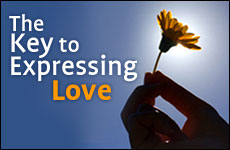 Iran’s Attack on Israel
Iran’s Attack on Israel


4 min read
Love is an active verb, not simply a passive response.
If everyone was given love in the way they most appreciate it, fewer people would still be searching for more.
Can you remember times when you felt unloved? Have you ever wished to be given a gift by your spouse? Spoken to positively in a way that expressed appreciation for the things that you do? Helped willingly, with chores, as your spouse took the initiative to help? Or, have you felt that although your spouse is a good provider, you never have enough quality time together, and really want more badly?
GIVING AND LEARNING LOVE
Rabbi Eliyahu Dessler teaches in his classic work "Michtav M'Eliyahu" that love is generated by giving. Love is an active verb, not simply a passive response like "being in love". What speaks volumes to you may be meaningless to your spouse. Wouldn't you want to give to your spouse in a way that "speaks" love to them?
You can learn your spouse's individual, primary need. Rather than live a life of want, you and your spouse can meet each other's need to be loved, better. It takes will, effort and discipline. The key is to understand what your spouse's needs are, and cater to them.
Here are several tips that can help you succeed in meeting each other's deepest emotional needs.
Develop knowledge of what your spouse truly appreciates. You and your spouse each have essential needs. First, figure out your own essential needs. Then move on to find out your spouse's. Ask what your spouse most enjoys receiving from you, and don't be surprised with what you find out.
Explore which of the following modes make you feel that your spouse loves you.
Is it:
Hearing verbal endorsements,
Receiving presents,
Showing affection,
Sharing "you and me" time,
Or being indulged with acts of consideration?
Any of these ways may be important to you; one in particular may be essential.
Which one is your spouse's primary need? Is it having appreciation and affection expressed in words, receiving gifts big or small, being allotted quality time, or being helped lovingly and caringly with everyday chores?
Here are three ways to unveil the hidden key.
Discovering Essential Love Needs: By Default
You may know what makes you feel most loved right away. Or, you may discover that, when you don't have a specific need met, you are deeply hurt. Eureka! You've now revealed your essential need backwards. Doing the opposite of what your need is, hurts you even more deeply than it would hurt someone else. Your need is essential to you. Its absence undercuts your basic sense of well-being and satisfaction.
Discovering Essential Love Needs: Through Action
Chances are the way you give love to your spouse is the way you enjoy receiving it most. Take time to note what you do most often. How do you express love? It's likely, that what you do lovingly may be what comes most naturally to you and what you'd most likely appreciate receiving in return. Generally, your style of expressing love is most likely what you've learned to do by modeling a parent's or mentor's behavior.
Discovering Essential Love Needs: Hearing your Love Request
Have you ever noticed what it is that you, most often, ask for from your spouse?
What you ask for is an important clue to your essential need. Without that form of interface with your spouse, you simply feel unloved.
Pay attention to which love mode is yours. Are you asking for quality time; gifts; a favor; physical touch or words of recognition, appreciation and affection?
Choosing to Love
The Hebrew word for love, "ahava," comes from the root word hav, to give. It's your choice to give or not to give. However, as you make the choice to give love, consider that you are nurturing your spouse, and helping meet their fullest capacity for living.
